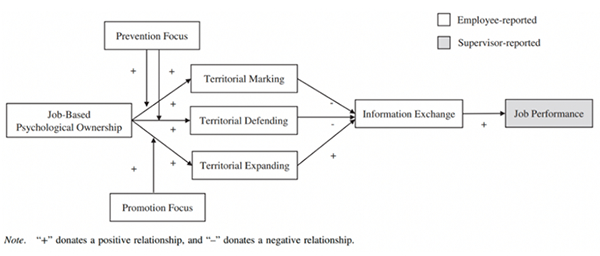
Supported by the National Natural Science Foundation of China (Grant Nos. 72132009 and 72171135), Assistant Professor Chen Xingwen from Fudan University, Professor Lin Weipeng from School of Management of Shandong University, and Professor Liu Jun from Renmin University of China, together with their overseas co-authors, expanded the theoretical concept of employee territoriality. From the perspective of resources, they used the employee territoriality to reveal the impact mechanism and the inherent mechanism of job ownership on job performance and the reaction mechanism of different types of employees in this process, and explained how and when to stimulate job performance and other management difficulties. The research results with the theme of “Feeling Possessive, Performing Well? Effects of Job-Based Psychological Ownership on Territoriality, Information Exchange, and Job Performance” was published in March 2023 in the Journal of Applied Psychology, an international journal at the intersection of management and applied psychology. Paper link: https://doi.org/10.1037/apl0001027.
The concept of territoriality originated from interdisciplinary studies in zoology, anthropology, and sociology, and is used to describe the behavior of an organism that cuts off a target and prevents other organisms from approaching or possessing it. Territoriality was introduced into the field of management at the beginning of the 21st century and is still in the early stages of exploration with the few studies focusing on employees’ defensive territorial behaviors (i.e., “territorial marking” and “territorial defense”). Drawing on interdisciplinary research on territoriality, this study proposes for the first time the concept of “territorial expansion” and develops a measurement tool, which enriched the theoretical connotation of territoriality and provided more diversified perspectives for interpreting the theoretical and practical issues of management related to territoriality.
The paper contains two sub-studies: the development of the measurement instrument and the testing of the theoretical model. In Study 1, a measurement tool for employee territorial expansion was developed and rigorously tested against psychometric indicators by collecting data from five different population samples from multiple countries. In Study 2,358 leader-subordinate pairs were collected in China for empirical testing. It found that for employees who focus on avoiding losses (prevention focus), psychological ownership of their work motivates them to engage in territorial defense behaviors, which inhibit information exchange with the outside and ultimately lead to low performance, while for employees who focus on gains (promotion focus), psychological ownership of their work motivates them to engage in territorial expansion behaviors, which promote information exchange and ultimately lead to high performance (Figure).
This study expands the concept of territoriality with an interdisciplinary background, challenges the previous one-sided understanding that territoriality is always negative, breaks through the management bottleneck of how leaders can shape work ownership, construct territorial boundaries and enhance organizational effectiveness, and promotes the cross-fertilization of research in organizational behavior and human behavioral ecology.